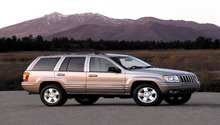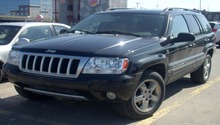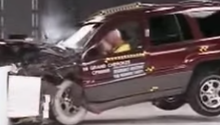Jeep Cherokee 1984-2001: Common Problems
Read on to uncover the hidden problems that could affect your Jeep Cherokee, should you fail to follow your general maintenance schedule.
This article applies to the Jeep Cherokee XJ (1984-2001).
The difference between a 1984 Jeep Cherokee and other Jeeps on the market today is the Jeep Cherokee is built to last for a very long time. In fact, for most Jeep owners, logging 300,000 miles or more on their odometer is no big deal. In fact, it's relatively easy. The key to keeping your Jeep Cherokee up and running for years to come is through proper maintenance. Even when common problems do crop up over the years, you'll want to be diligent in having each one properly diagnosed and repaired by a certified mechanic or at a local Jeep dealership. Here are the main common problems you'll want to be on the lookout for as you maintain your Jeep Cherokee for years down the line!
Common Problems
Taking a look at the Jeep Cherokee, you'll see a few common problems appearing again and again in owner complaints.
- On the 1989 Jeep Cherokee, minor to major issues were reported, including various wiring and electrical issues, rusted out floor pans, which needed to be cut out of the vehicle and replaced, as well as rust in other places, a malfunctioning radiator, and various other broken components, such as a busted-out air cleaner box.
- On the 1991 Jeep Cherokee, minor to moderate issues under the hood, as well as inside of the cabin, were reported. The biggest problems were related to the air conditioner not working properly, the power windows malfunctioning, the loss of movement in the steering wheel, and the battery failing. Depending on your level of automotive expertise, many of these fixes can be done from the comfort of your home garage. You might also need to replace a leaky rear shock absorber.
- On the 2001 Jeep Cherokee, owners reported windshield leaks, a faulty power window master switch and misfires due to hard driving. Side mirrors might become faulty after some time, as well.

Engine Idles Poorly in Heat
Jeep Cherokee owners often reported that in high temperatures their Jeep would idle poorly for several minutes, and then perform normally. The most likely culprit is dirty, worn or cracked fuel injectors, which will need to be replaced, as they make your engine more susceptible to heat soak. Installing hood vents should also alleviate the problem. It's also recommended that you take a load off the engine by turning off your air conditioner, approximately three to five minutes before you are expected to reach your destination. Bad fuel injectors can also cause your gas mileage to drop, which is also a common problem facing the Jeep Cherokee. If your budget allows for it, replacing your exhaust manifold will help reduce engine heat as well as improve gas mileage.

Broken Speakers and Creaky Sounds in Cargo Area
Not all problems facing the Jeep Cherokee are under the hood; some are directly related to the dashboard, including speaker problems. The likely culprit is a broken wire leading to the speaker(s). Have the wire replaced, and your speakers should produce sound as normal. If you notice a creaking sound coming from the cargo area, don't panic. The likely culprit is a broken latch or poor lubrication along the seat latches. Repair the latch, and apply lubrication as needed.

Common Questions
What should I do if my Jeep Cherokee is recalled?
The first thing you'll want to do is wait to be notified in writing by Jeep that your vehicle has been recalled. Next, you'll want to set up an appointment to visit your local Jeep dealership. Your local Jeep dealer will verify that your vehicle identification number (VIN) is, in fact, part of a recall. If it is, your dealer will repair any faulty part(s) that are named in the recall at no cost to you.
What should I do if a technical service bulletin (TSB) is issued on my Jeep Cherokee?
The first thing you'll want to do is discuss the issue with your local Jeep dealer or a certified mechanic. These kinds of repairs are not covered by Jeep and will need to be paid out of your own pocket. It's important that you understand your financial responsibility when agreeing to have such repairs made. However, it's important to note, TSBs can help your mechanic to diagnose possible (or existing) problems more quickly, saving you more money in the long-run. In other words, they should not be ignored.
What is the best way to prevent common problems facing other Jeep owners?
A number of factors can contribute to vehicle problems and maintenance issues. Your best bet is to follow your general maintenance schedule to the letter, and have all repairs made in a timely matter. While you may think mileage is the number one determinant in how long your Jeep lasts, the truth is how well you maintain your vehicle matters more. Keep your fluids clean and topped up, and have a professional, certified mechanic inspect all major systems every 30,000 miles or so, depending on how you use your vehicle.
Related Discussion
- Extremely Common Problems XJ How to Fix Them - CherokeeForum.com






